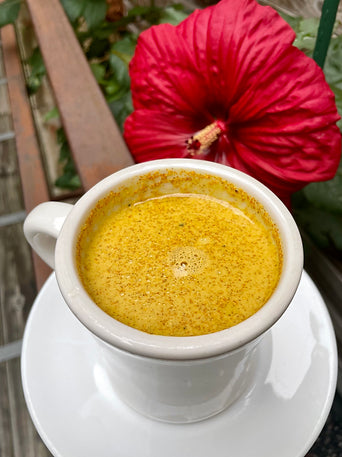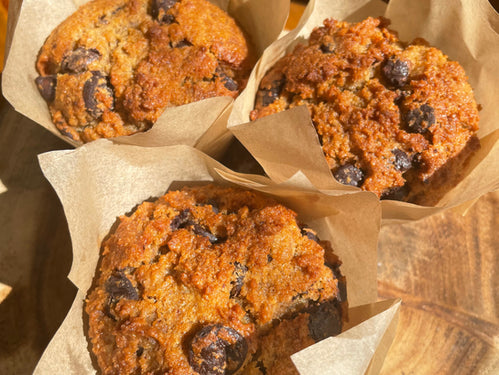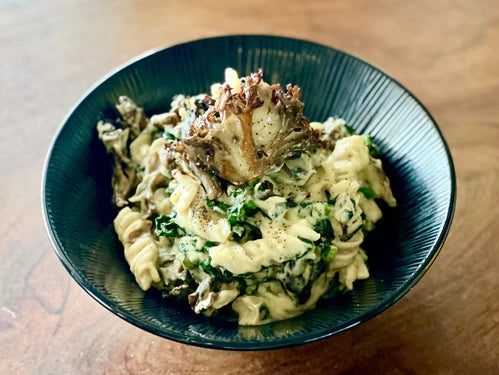Fight or Flight
The mind and gut are tightly connected. The gut-brain axis is a bidirectional communication network which runs between the central nervous system (the brain and the spinal cord) and the enteric nervous system (lies within our gut).(1) The Enteric nervous system, referred to as our “second brain,” signals hormone secretion, controls digestion, and responds to dietary changes.

Our vagus nerve connects these two systems which link emotional and cognitive centers of the brain with the intestinal activity.(2) You see, it’s nearly impossible to ignore life’s everyday stressors. But how we manage them is up to us! Stress can activate our sympathetic nervous system which triggers the release of stress hormones, like cortisol and adrenaline. These chemicals can then initiate the “fight or flight” response. Fight or flight isn’t supposed to be long term. It lasts only for short, functional purposes. However, with constant stress, the body forms a routine which results in a biochemical imbalance.(3) This disrupts our gut health, our mood, our sleep, and our well-being.
In Radical Beauty, meditation teacher and nutritionist Kimberly Snyder states 3 options to consider when it comes to stress:
Are you creating the stress?
Are you reacting to outside stressors?
Are you helping to reduce and heal the stress?
Try to genuinely think about these questions when stress occurs in your life. By getting past the first two situations, and healing stress, one can maintain restful alertness which is the foundation of mind-body balance.(4) Choosing how the stress may or may not manifest itself can be a powerful move. To keep the ongoing peace, try:

-
Journaling - Get your thoughts out on paper. It can help put things into perspective for you and clear your mind of any negative, wandering thoughts. Journaling can also help prevent other people you come into contact with from taking a hit from your own personal stressors.
-
Meditation - Guided in person, on an app, YouTube, etc., or on your own
-
Yoga - Try Yoga Nidra which incorporates relaxation practices such as guided meditation, breathing techniques, and body scans which can work as a nervous system reset. This practice can help allow us to be present and calm the body.
-
Talk it out! Whether that be with friends, family, a therapist or counselor. Support the mind-body connection by building community.
-
Move your body - Find exercise that works for you! Take long walks to get to know your community. Or perhaps sign up for classes (yoga, strength training, boxing, barre, pilates, etc. - online or in-person). Classes can help hold a person accountable to their scheduled workouts and find like-minded friends.
-
Get enough sleep - Work on a nighttime routine. That may be dimming the lights, unplugging 1 or 2 hours before bed (phone, tv, tablets, etc.), and consider removing the television, and maybe even smaller devices from the bedroom altogether. Try reading books instead.
-
Get outside more - Soak up the sun! With proper SPF that is. Vitamin D is said to protect neurons and reduce inflammation. And of course the sun puts us in much happier moods!(5)
Combat Stress + Depression with…food?!
Food has powerful effects on how we think and how we feel. Looking at how other countries differ from ours in terms of diet and therefore disease is shocking. Hormone-related cancers were rare in Japan forty years ago when a majority of the population was sustaining largely on rice and vegetables. However, throughout the 80’s and 90’s, cancer and menopausal symptoms were on the rise, along with our Western influences of fast food and high amounts of meat and dairy products.(6) Mood issues were also rarely reported until the 90’s. There seem to be parallels with the influx of said foods that were not traditionally consumed in Japan and mood disorders. Some may also note that the stoicism on part of the Japanese people in past history and/or their current workforce grind that is put upon them may contribute to a rise in depression as well. According to patient surveys, depression became more common approaching the new millennium. Animal product consumption continued to rise, and as for rice consumption, it fell to half of its pre-World War II levels.(7)
Eat for Happiness

Fiber - Get lots of fiber in from fruits, vegetables, beans, nuts, and whole grains. An enormous survey called The National Health and Nutrition Examination (NHANES) found that the average American gets about half (16 grams) of the recommended daily fiber intake a day being about 25-35 grams.(8) Eating plenty of fiber (which is only found in the roughage of plants) aids in digestion. Have you ever been constipated and it just puts you in a bad mood? Can’t fit into clothing, terribly uncomfortable, etc. Well in addition to aiding in healthy bowel movements and therefore bettering our mood, fiber can help stabilize blood sugar. The fiber ferments in the digestive tract which releases short-chain fatty acids that can have positive effects on our mood.(9) Through diet and lifestyle changes, it is possible to truly heal our guts. Heal the gut, heal the hormones.
-
Soy - Isoflavones in soy products have been studied for their mood-stabilizing effects, among many other benefits. Studies suggest that consuming just 2-4 servings of soy per day may induce an antidepressant effect. Being that soy is very prevalent in many Asian countries including Japan; this could be an explanation for the lower percentage of the Japanese population who struggle with depression who consume traditional diets. This of course comes with an increase of depression where the traditional diets are exchanged for Westernized processed, meat and dairy-heavy meals.
-
Carbohydrates - A study using over 106 overweight volunteers in Australia showed that compared to a low carbohydrate diet, a low fat diet improved the volunteer’s moods for a longer period of time. The low carb group struggled with more anxiety, depression, and hostility.
-
Plant Protein - Start the day off with plant proteins. If you incorporate toast or oatmeal as well, that’s fine! Just have the proteins first. This could be a tofu scramble, soymilk, tempeh, or chickpeas. Many cultures have higher protein plant-based breakfasts such as black beans in Mexico, hummus in the Middle East, and beans on toast in England.(11)
Inflammation

A plant-based diet has been shown to reduce inflammation.(12) Inflammation is usually intimately tied to a wide range of diseases according to molecular and epidemiological research.(13) This includes auto-immune diseases such as rheumatoid arthritis and Sjögren's Syndrome which can cause fatigue and chronic pain. Tennis star Serena Williams developed Sjögren's Syndrome and tackled the disease by cutting out all animal products.
Inflammation can affect the brain as well, by causing chemical changes. Compared to people who did not suffer from depression, blood tests have shown that people with depression had higher levels of inflammatory proteins within their bloodstreams.(14) This can also lead to further damage, as depression is linked to higher levels of dementia. A low fat, plant-based diet has been viewed as having an antidepressant effect. Australian researchers note that this may be due to the removal of arachidonic acid which is found in meat and eggs and can promote inflammation in the brain.(15)
1. Carabotti M, Scirocco A, Maselli MA, Severi C. The gut-brain axis: interactions between enteric microbiota, central and enteric nervous systems. Ann Gastroenterol. 2015 Apr-Jun;28(2):203-209. PMID: 25830558; PMCID: PMC4367209.
2. ibid.
3. Chopra, D. (2018, January 2). 274. Radical beauty: How to transform yourself from the Inside out: Paperback. Barnes & Noble. Retrieved April 19, 2023, from https://www.barnesandnoble.com/w/radical-beauty-deepak-chopra/1123178218
4. Chopra, D. (2018, January 2). 276. Radical beauty: How to transform yourself from the Inside out: Paperback. Barnes & Noble. Retrieved April 19, 2023, from https://www.barnesandnoble.com/w/radical-beauty-deepak-chopra/1123178218
5. Liu W, Zhang L, Xu HJ, Li Y, Hu CM, Yang JY, Sun MY. The Anti-Inflammatory Effects of Vitamin D in Tumorigenesis. Int J Mol Sci. 2018 Sep 13;19(9):2736. doi: 10.3390/ijms19092736. PMID: 30216977; PMCID: PMC6164284.
6. Barnard, Neal (2021). 173. Your body in balance: The new science of food, hormones, and health. Grand Central Pub.
7. Barnard, Neal (2021). 174. Your body in balance: The new science of food, hormones, and health. Grand Central Pub.
8. High fiber diet: Types of Food & Health Benefits. Cleveland Clinic. (n.d.). Retrieved April 19, 2023, from https://my.clevelandclinic.org/health/articles/14400-improving-your-health-with-fiber
9. Barnard, Neal (2021). 175. Your body in balance: The new science of food, hormones, and health. Grand Central Pub.
10. Barnard, Neal (2021). 177. Your body in balance: The new science of food, hormones, and health. Grand Central Pub.
11. Barnard, Neal (2021). 179. Your body in balance: The new science of food, hormones, and health. Grand Central Pub.
12. Barnard, Neal (2021). 175. Your body in balance: The new science of food, hormones, and health. Grand Central Pub.
13. Hunter P. The inflammation theory of disease. The growing realization that chronic inflammation is crucial in many diseases opens new avenues for treatment. EMBO Rep. 2012 Nov 6;13(11):968-70. doi: 10.1038/embor.2012.142. Epub 2012 Oct 9. PMID: 23044824; PMCID: PMC3492709.
14. Barnard, Neal (2021). 176. Your body in balance: The new science of food, hormones, and health. Grand Central Pub.
15. ibid.





Leave a comment
This site is protected by hCaptcha and the hCaptcha Privacy Policy and Terms of Service apply.